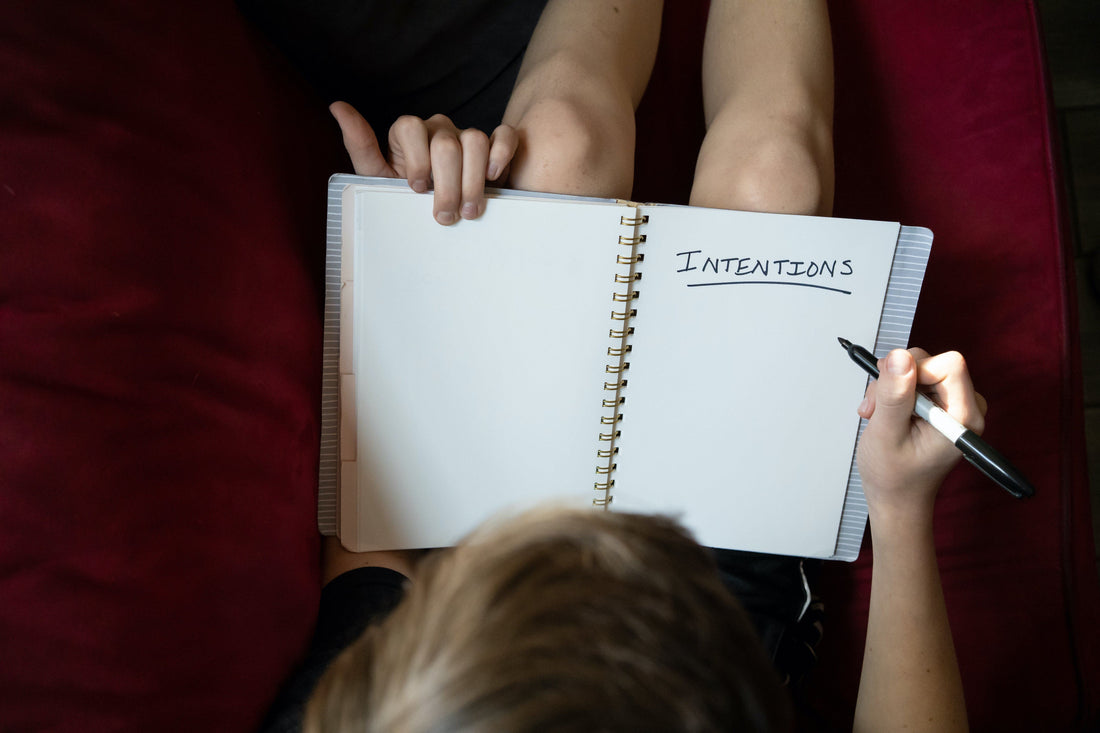Setting daily intentions aren’t just a great way to stay focused on your goals; they’re also an effective way to reduce stress. And with 80 percent of Americans reporting emotions related to prolonged stress in the 2021 Stress in America survey, it’s crucial that we find ways to feel calmer and more balanced for our overall health.1 After all, studies show that emotional stress is a major contributing factor to the six leading causes of death: cancer, coronary heart disease, accidental injuries, respiratory disorders, cirrhosis of the liver, and suicide.2 To reduce stress and revamp your daily routine, find out how to set daily intentions and the benefits you can expect from doing so.
Benefits of Setting Daily Intentions
One of the benefits of setting a daily intention is it motivates us to tackle our goals. While setting an intention is less about achieving a tangible result, it certainly puts us on the right course. In a 2002 study published in the British Journal of Health Psychology, students were divided into groups and asked to stick to an exercise regime.3 Researchers educated students on the benefits of exercise in order to motivate them, but only a select group of students were required to set a clear intention of living healthier, specifically detailing when and where they would actually exercise. Ninety-one percent of students required to set a clear intention stuck with their exercise regime compared to just 35 percent of students who did not set intentions.
Other benefits of daily intentions include:
- Feeling empowered and in control of your destiny
- Accomplishing more in the day
- Experiencing a newfound sense of purpose
- Focusing on possibilities instead of limitations, which can be uplifting
- Experiencing gratitude
- Contributing more to the world around you
How Setting Daily Intentions Can Help with Stress & Anxiety
Setting daily intentions can help reduce stress and anxiety on a cellular level. According to Dr. Bruce Lipton, an American developmental biologist notable for his work on epigenetics, when we set intentions, the beliefs we hold in our minds are transformed into “electromagnetic fields” by nerve cells.4 The brain then transmits this information to all of the cells within our body. He explains that when we set positive intentions, every cell within our body will align with the intention we have just set and “vibrate” at the same positive frequency. On the other hand, if we are bogged down by negative thinking and fail to set positive intentions, our cells will respond by preparing to fight or flight, initiating the body’s stress response.
How to Set Your Daily Intention
When it comes to setting your daily intention, Rick Hanson, Ph.D., a neuropsychologist and author of Hardwiring Happiness: The New Brain Science of Contentment, Calm, and Confidence, has some advice.5 He says intentions are effective when they are “grounded in reality.” Slowing down and staying mindful of the bigger picture will help you figure out how to distinguish implausible dreams you’ll have difficulty accomplishing in the day from realistic aims that truly matter. Here are some other tips for setting your daily intention:
Recommended Videos
- Be specific: Just like the participants in the British exercise study, being specific about your intentions will help you stick to your course. Writing down your intention is also a great motivator that will hold you accountable to your aims.
- Visualize: What would your intention feel like if you accomplished it? What actions will you have to take to get there? Visualizing yourself living your intention will motivate you to follow through.
Daily Intention Examples
Unlike goals, which are finite and depend upon reaching a specific destination, intentions are more about the direction you plan to take in your daily life. While goals are often regarded as external achievements, intentions require us to turn inward and decide how we wish to engage with the world around us. Another way to look at goals vs. intentions is that goals are projections into the future while intentions are rooted in the present. Here are some examples of daily intentions you can live today:
- I will be more present in the moment.
- I will embrace the unknown.
- I will listen to my intuition and let it guide me.
- I will remember that I am enough.
- I will make time for playfulness and fun.
- I will look for beauty everywhere I go.
- I will learn something new today.
- I will be a better listener.
Setting daily intentions is one way to upgrade your daily routine with quiet moments of mindfulness and relaxation. If you’re struggling with stress and anxiety, some other daily habits to consider include eating healthy food, getting enough sleep, and limiting your screen time. These habits are part of Brillia’s 5-Pillar program, a holistic approach to reducing stress and anxiety with healthy lifestyle choices. Combined with Brillia, a non-prescription medication specifically targeted to reduce anxiety and improve focus without harsh chemicals or harmful side effects, these healthy lifestyle choices will help you feel more balanced and supported in your daily life. Learn more about how Brillia works and find more resources about reducing stress and anxiety at the Brillia blog.
Erica Garza is an author and essayist from Los Angeles. She holds an MFA from Columbia University and a certificate in Narrative Therapy. Her writing has appeared in TIME, Health, Glamour, Good Housekeeping, Women's Health, and VICE.







